Related Research Articles

2000 AD is a weekly British science fiction-oriented comic magazine. As a comics anthology it serialises stories in each issue and was first published by IPC Magazines in 1977, the first issue dated 26 February. Since 2000 it has been published by Rebellion Developments.

Captain Britain is a title used by various superheroes in comic books published by Marvel Comics, commonly in association with Excalibur. The moniker was first used in publication by Brian Braddock in Captain Britain #1 by writer Chris Claremont and artist Herb Trimpe, and is currently held by Brian's twin sister, Betsy Braddock.
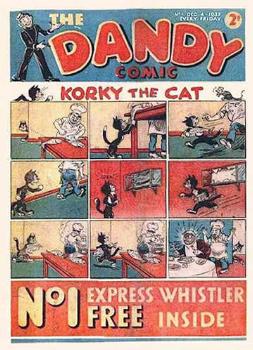
The Dandy was a Scottish children's comic magazine published by the Dundee based publisher DC Thomson. The first issue was printed in December 1937, making it the world's third-longest running comic, after Il Giornalino and Detective Comics. From August 2007 until October 2010, it was rebranded as Dandy Xtreme.

A British comic is a periodical published in the United Kingdom that contains comic strips. It is generally referred to as a comic or a comic magazine, and historically as a comic paper. As of 2014, the three longest-running comics of all time were all British.

Beryl the Peril is a fictional character created by David Law, the creator of Dennis the Menace, for issue 1 of The Topper comic published by DC Thomson & Co. Limited. Like Dennis, she had black and red apparel, and devilishly tormented her parents and other members of her community. Despite not having quite as many appearances as other DC Thomson characters such as Dennis the Menace or Desperate Dan, Beryl is still considered one of the classic characters which define the popularity of British comics.
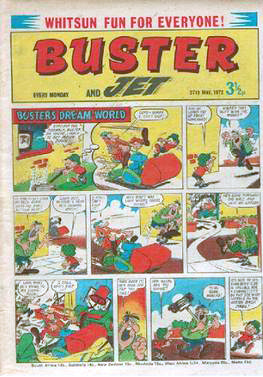
Buster was a British comic which began publication in 1960, originally published by IPC Magazines Ltd under the company's comics division Fleetway, then by Egmont UK Ltd under the same imprint until its closure in 2000. Despite missing issues due to industrial action during its run, the comic published 1,902 issues in total. The comic carried a mixture of humour and adventure strips, featuring the title character Buster and a host of other characters.
Ken Reid (1919–1987) was a British comic artist and writer, best known as the co-creator of Roger the Dodger and Jonah for The Beano and Faceache for Jet.
Cheeky Weekly was a British comic book magazine published every Monday by IPC Magazines Ltd. It ran for 117 issues from 22 October 1977 to 2 February 1980, failing to be published for 3 weeks in December 1978 due to an industrial dispute. It merged with stable-mate Whoopee!, initially as a 16-page pull-out section. The title character originated in an earlier comic called Krazy as a character in the strip The Krazy Gang and also the star of the 'Ello, It's Cheeky feature, and proved popular enough to get his own comic, which managed to outlive Krazy itself. The first issue came with a free "Red Jet Rattler". Its characters and strips included:
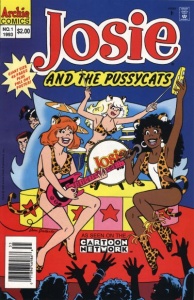
Josie and the Pussycats is a teen-humor comic book about a fictional rock band, created by Dan DeCarlo and published by Archie Comics. It was published from 1963 until 1982; since then, one-shot issues have appeared on an irregular basis. A second series, set in the New Riverdale universe, launched in September 2016.

Korky the Cat is a character in a comic strip in the British comics magazine The Dandy. It first appeared in issue 1, dated 4 December 1937, except for one issue, No. 294 when Keyhole Kate was on the cover. For several decades he was the mascot of The Dandy. In 1984, after 47 virtually continuous years, Korky was replaced on the front cover by Desperate Dan.
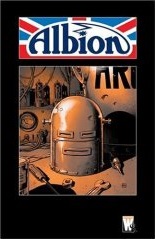
Albion is a six-issue comic book limited series plotted by Alan Moore, written by his daughter Leah Moore and her husband John Reppion, with covers by Dave Gibbons and art by Shane Oakley and George Freeman. The series aimed to revive classic IPC-owned British comics characters ), all of whom appeared in comics published by Odhams Press and Amalgamated Press/Fleetway Publications/IPC Media during the 1960s and early 1970s, such as Smash!, Valiant, and Lion.
The Steel Claw was one of the most popular comic book heroes of British weekly adventure comics of the 1960s and 1970s. The character was revived in 2005 for Albion, a six-issue mini-series published by the Wildstorm imprint of DC Comics.

Lion was a weekly British comics periodical published by Amalgamated Press from 23 February 1952 to 18 May 1974. A boys' adventure comic, Lion was originally designed to compete with Eagle, the popular weekly comic published by Hulton Press that had introduced Dan Dare. It debuted numerous memorable characters, including Captain Condor, Robot Archie, Paddy Payne and the Spider. Lion lasted for 1,156 issues before being merged with stablemate Valiant.

Valiant was a weekly British comics periodical published by Fleetway Publications and later IPC Magazines from 4 October 1962 to 16 October 1976. A boys' adventure comic, it debuted numerous memorable characters, including Captain Hurricane, The Steel Claw and Mytek the Mighty. Valiant lasted for 712 issues before being merged with stablemate Battle Picture Weekly.

Pow! was a weekly British comic book published by Odhams Press' Power Comics imprint in 1967 and 1968. Like other Power Comics, Pow! featured a mixture of British strips with reprints from American Marvel Comics, including Spider-Man, Nick Fury, Agent of SHIELD and the Fantastic Four.

Smash! was a weekly British comic book, published initially by Odhams Press and subsequently by IPC Magazines, from 5 February 1966 to 3 April 1971. After 257 issues it merged into Valiant.
Janus Stark, or The Incredible Adventures of Janus Stark, is a British comic strip series, originally written by Tom Tully and drawn by Francisco Solano López. It is about an escapologist in Victorian London who appears to be simply an unusual act on the music hall stage, but who privately uses his extraordinary abilities to battle against injustice. The strip debuted on 15 March 1969 in Smash! and ran in that title until 1971, when it moved to Valiant, running for another four years until 1975.

Jet was a weekly British comics periodical published by Fleetway Publications from 1 May to 25 September 1971. A boys' adventure comic, the title only lasted for 22 editions before being merged with another Fleetway title, the long-established Buster.
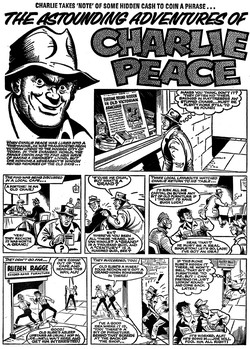
"The Astounding Adventures of Charlie Peace" is a British comic strip published in the weekly anthology Buster from 27 June 1964 to 15 June 1971, published by Fleetway Publications and later IPC Magazines. It was previewed by a single instalment in Valiant on 20 June 1964. The strip featured fictionalised adventures of the real-life Victorian era criminal Charles Peace.

The Dwarf is a British comic character who has appeared in eponymous strips published by IPC Magazines. The character, a criminal genius who operated an army of highly realistic robots, first appeared in the anthology title Jet on 8 May 1971. The strip mixed adventure and comedy elements, with the Dwarf frequently breaking the fourth wall to address readers directly.
References
- ↑ 2000 AD to revive children's comics from the '70s and '80s | The Bookseller
- ↑ Albion #1-6 (WildStorm [DC Comics], August 2005–November 2006).